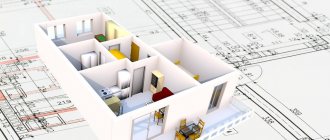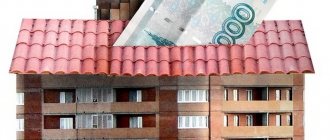Obligation to pay for the maintenance and repair of visual equipment in the apartment building
Management organizations issue invoices to the owners of non-residential premises for the maintenance and repair of the common property of apartment buildings. The owners of such premises refuse to pay the received payment documents, arguing that they do not have a contractual relationship with the management company.
By virtue of clause 2 of Art. 8.1 of the Civil Code of the Russian Federation, the right of ownership of property subject to state registration arises, changes and terminates from the moment the corresponding entry is made in the state register, unless otherwise provided by law.
The owner bears the burden of maintaining the property he owns (Article 210 of the Civil Code of the Russian Federation).
Common property in an apartment building belongs to the owners of the premises on the right of common shared ownership, in accordance with clause 1, part 1, art. 36 Housing Code of the Russian Federation. The common property of apartment buildings includes premises that are not parts of apartments and are intended to serve more than one room in such a building:
- inter-apartment landings;
- stairs;
- elevators;
- elevator and other shafts;
- corridors;
- technical floors;
- attics;
- basements with utility lines;
- other equipment serving more than one room.
Each participant in common shared ownership is obliged, in proportion to his share, to participate in the payment of taxes, fees and other payments on common property, as well as in the costs of its maintenance and preservation (Article 249 of the Civil Code of the Russian Federation).
Owners of premises in apartment buildings bear the burden of expenses for maintaining common property in an apartment building (Part 1 of Article 39 of the Housing Code of the Russian Federation).
In accordance with Part 2 of Art. 154 of the Housing Code of the Russian Federation, payment for residential premises and utilities of the owner of the premises in an apartment building includes payment for services and work on managing such a house, for the maintenance and ongoing repairs of common property in an apartment building, for utility resources consumed during the use and maintenance of public buildings in an apartment building.
The owner's obligation to pay maintenance and repair costs is not conditioned by the existence of a contractual relationship with the management organization. This conclusion can be found in paragraph 24 of the Review of judicial practice of application of the legislation of the Russian Federation on the contract system in the field of procurement of goods, works, services to meet state and municipal needs, approved by the Presidium of the Supreme Court of the Russian Federation on June 28, 2017.
By virtue of Part 2.3 of Art. 161 of the Housing Code of the Russian Federation and clause 10 of the Decree of the Government of the Russian Federation of August 13, 2006 No. 491, the performance of work and provision of services for the maintenance of the common property of an apartment building is mandatory for the management organization in accordance with the legislation of the Russian Federation. The MA cannot refuse to perform such work and provide services even if a state or municipal contract has not been concluded.
The fact that the owner of non-residential premises did not take action to conclude a contract to fulfill the obligation to bear expenses for common property does not relieve him of the obligation to pay the appropriate fee.
Thus, the owner of a non-residential premises located in an apartment building, by virtue of the direct instructions of the law, is obliged to bear the costs of maintaining the common property, unless otherwise provided by law or contract.
Debt collection in the housing and communal services sector
Rights of owners of non-residential premises
The same questions arise regarding the owners of any non-residential premises: parking spaces, storage rooms, parts of the attic and basement. In turn, their owners are interested in whether they should pay for the maintenance of common property, for example, an elevator or for cleaning the entrance, because they do not use these services.
According to GOST R 51929-2014 “Housing and communal services and management of apartment buildings. Terms and definitions”, approved and put into effect by order of Rosstandart dated June 11, 2014 No. 543-st, the owner is the person who has the right of ownership of the premises in the apartment building.
During the operation of an apartment building, he also exercises his other rights: “ownership, use, maintenance and disposal of this premises in accordance with its purpose and the limits of its use, as well as part of the common property of the apartment, if such a premises is a room in a communal apartment, which also The common property in an apartment building belongs by right of common shared ownership...”
The owners of residential and non-residential premises in the house personally or through a legal representative have the right to vote at general meetings of owners (Part 1 of Article 48 of the Housing Code of the Russian Federation). When voting, each owner has a number of votes proportional to his share in the right of common ownership of common property in the apartment building (Part 3 of Article 48 of the Housing Code of the Russian Federation).
Thus, if a premises, residential or non-residential, for any purpose - storage room, parking space, attic - belongs to a person by right of ownership, he has the right to vote in the OSS. This was indicated by the Ministry of Construction of the Russian Federation in a letter dated October 5, 2017 No. 35851-EC04.
The owner of a non-residential premises is subject to the same rights as any other owner in the building. Please note that ownership of the premises must be registered in the Unified State Register of Real Estate.
Owners of non-residential premises and fees for maintaining public buildings in apartment buildings
11757911
Debt collection from owners of non-residential premises
Owners of non-residential premises in apartment buildings are required to pay for housing and communal services according to the same rules as owners of residential premises. The management organization may require the owner of non-residential premises to promptly pay fees for the maintenance and repair of the common property of an apartment building.
If the owner of a non-residential premises refuses to pay the management organization for the maintenance and repair of common property, you should first try to resolve the issue amicably and explain to the owner of the non-residential premises why he is obligated to pay for the maintenance and repairs of the residential premises: send debt payments, letters or try to conclude an agreement about debt repayment.
If the owner refuses to pay the bills, the management company should proceed to pre-trial debt collection: before filing an application to the court, the debtor must submit a claim demanding payment of the debt on a voluntary basis. According to Part 5 of Art. 4 of the Arbitration Procedure Code of the Russian Federation, the debtor is obliged to respond to such a claim within 30 calendar days.
If the debtor refuses or does not respond to the claim at all, the management organization may file a claim in court. The Arbitration Court considers such applications. But it happens that disputes reach the Supreme Court of the Russian Federation.
An example of such a dispute is given in the ruling of the Supreme Court of the Russian Federation dated November 28, 2017 in case No. 305-ES17-10430. In it, the court indicated that the management organization can recover the debt for the maintenance and repair of common property from the owner of non-residential premises.
How to register partial repayment of debt for housing and communal services
On a note
There are no differences in the responsibilities of owners of residential and non-residential premises regarding the maintenance of common property (Article 39 of the Housing Code of the Russian Federation).
The owner of the apartment and the owner of the storage room or parking space in the apartment building equally participate in the maintenance of common property. Individuals and legal entities must pay for consumed utilities, including those spent on the maintenance of public buildings, and major repairs in the house. Payment must be made on time and in full.
Meanwhile, the owners of non-residential premises have the right to own, use, maintain and dispose of the premises in accordance with its purpose and the limits of its use.
Non-residential premises are part of an apartment building, if it is indicated in the technical documentation. If such a premises is registered as a property, its area is taken into account in the total area of the premises, the owners of which jointly own common property and can participate in the OSS.
The owner of a non-residential premises also has the right to participate in the general meeting of owners, the number of his votes is proportional to the area of the specified premises.
Who owns the rights to use real estate?
The answer to this question is contained in Article 212 of the Civil Code of the Russian Federation, which states that the following persons can be the owners of non-residential properties:
- individuals;
- legal entities;
- RF;
- subjects of the Russian Federation;
- municipalities.
Despite the fact that this is not precisely stated in the law, individuals and legal entities can own property regardless of their national origin, therefore all foreigners can actually and legally be owners. Any legal entity can purchase a non-residential apartment building and dispose of it at its own discretion.
In this case, the position of the foreign owner will not be any different from domestic subjects of law (national regime).
What does a property management company do?
Property management is aimed at creating conditions that are most beneficial for the owner and creating a professionally thought-out scheme for the use of real estate. This includes:
- Competent management of the real estate property.
- Creation of normal operation of public utilities.
- Competent representation of the property on the real estate market.
- Work on relations with the public and local authorities.
- Participation in the creation of a real estate development plan.
The management organization in a non-residential complex has the following responsibilities:
- negotiates with authorities, organizations, owners;
- organizes legal support and conclusion of transactions and agreements with RSO;
- searches and concludes an agreement with a cleaning company;
- creation of appropriate and necessary protection of the object, through search, conclusion of an agreement with private security companies;
- acts as a guarantor of the fulfillment of concluded contracts;
- chooses a strategy for careful and expedient spending of finances on the maintenance of the property.
Goals
Main objectives of real estate market management:
- According to the Constitution, every citizen has the right to own, use and dispose of residential and non-residential facilities and acquire the responsibilities associated with owning real estate.
- All participants in the real estate market must function in accordance with the procedures and laws adopted in this area.
- All parties and persons involved in real estate transactions must be more reliably protected from deception and fraud by criminals and criminal gangs in the real estate sector.
- Setting real estate prices according to supply and demand, i.e. ensuring free competition in the real estate market.
- Creating favorable conditions for investing in commercial real estate and construction in general.
- Providing people with housing, according to their standard of living and income, and creating better conditions for a comfortable and safe life and doing business.
- Control over tariffs and appropriate taxation of taxation of property owners.
- Solving the housing problem not only in the capital, but also in the regions and the most remote provinces.
Goals and objectives of managing non-residential facilities:
- Creating favorable conditions for the life of citizens.
- Development of the economy and entrepreneurship.
- Ensuring efficient use of property.
Privatization rules
Reference. Non-residential premises can be privatized if they are in state or municipal ownership in accordance with Art. 217 Civil Code of the Russian Federation.
As a rule, the tenant himself is usually interested in this.
In this case, there is no need to equate this with the privatization of ordinary apartments, since residential property is transformed into private property according to slightly different rules of Federal Law No. 178. Federal Law No. 159 provides for the tenant's pre-emptive right to privatize a non-residential property, but for this it is necessary to be an entrepreneur for at least 3 years.
However, it is worth remembering that such property is always alienated on a paid basis, so you should not count on acquiring the premises for free. Its value will be equal to the market price of the property, and in the case of alienation of the land plot - to the cadastral value. In order to do everything correctly, you need to contact the city administration through the MFC and provide the following documents:
- statement;
- lease contract;
- extracts from the cadastre;
- applicant's passport.
Only after a positive decision has been made by the administration, the tenant pays the cost of privatization. Problems may arise if the person interested in this rents part of the non-residential premises. In this case , it will be very difficult to privatize the premises, but it is only possible if it can really be isolated .
A person who has never been a tenant of a non-residential property can only purchase it at auction.
IMPORTANT. In an apartment building, it is impossible to privatize the common property of the owners (entrances, balconies, attics, basements, landings), as well as the local area.



